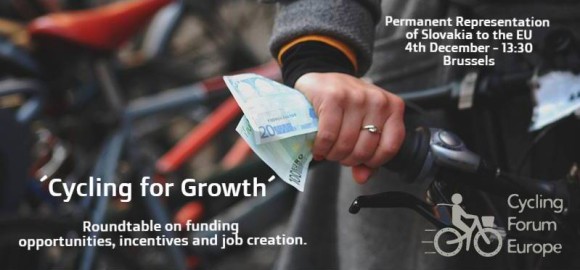
´Cycling for Growth´Roundtable: funding opportunities, incentives and job creation
´Europe´s cycling industry now employs more people than mining and quarrying and almost twice as many as the steel industry, according to the first comprehensive study of the jobs created by the sector.´
The Guardian, 12-11-14
The European Cyclists´Federation, in the framework of the ´Cycling for Growth´Roundatble, will publish three new economic studies:
An overview of opportunities for using EU Funds for cycling projects
“I have seen what the Cohesion Funds and Structural Funds have done for cycling, for example in my own country. We now have some incredible cycling routes, and we use them really well. So I hope that this culture of cycling will be part of our culture as well.”
Violeta Bulc, Commissioner for Transport
A new EU financial period has started and with the Partnership Agreements and Operational Programmes starting to be adopted focus is now switching to opportunities for funding over the coming years. The ECF has undertaken a review of all the documents currently available to see what opportunities there will be to fund cycling-related projects. At the event in December we will be presenting our findings together with advice and suggestions for anyone interested in funding cycling projects and examples of successful projects from previous years.
Cycling Works: Jobs and job creation in the European cycling sector
The cycling sector is a big employer with the equivalent of around 650,000 full-time jobs in Europe. With a doubling of cycling’s modal share, the employment potential of cycling can reach one million full-time jobs. This increase is backed up by a higher number of jobs per million turnover (more growth = more jobs). Investing in cycling means a more inclusive Europe and puts a healthy local economy at the heart of the EU's development. The "Cycling Works" study backs up these assertions, and more.
The Guardian, 12-11-14
Commuting: Who pays the bill? Overview of fiscal regimes for commuting in Europe
Commuting stands for an important part of traffic in Europe, and fiscal systems have long played a major role in the prevalence of motorized commuting in Europe. Fiscal regimes for cars are flawed and they have important ramifications which hinder the development of commuting by other modes of transport – including that of cycling – despite the fact these have many secondary benefits. The study on fiscal regimes for commuting provides case studies of 11 European countries, analysing the state of play for fiscality in commuting and coming up with specific country-by-country recommendations on how fiscal regimes can be used by governments to create a better balanced mobility.
´Cycling for Growth´is the first event in the framework of the just launched in the European Parliament with the participation of the European Transport Commissioner, MEP´s and a large representation of the EU institutions, national and regional representations to the EU, ´Cycling Forum Europe´.
The event will take place at the Permanent Representation of Slovakia to the EU on 4th December and it will target national and regional officers and fiscal and economic experts.
Please find more information about the event here.
- Log in to post comments
Contact the author
Recent news!
Upcoming events
Contact Us
Avenue des Arts, 7-8
Postal address: Rue de la Charité, 22
1210 Brussels, Belgium










